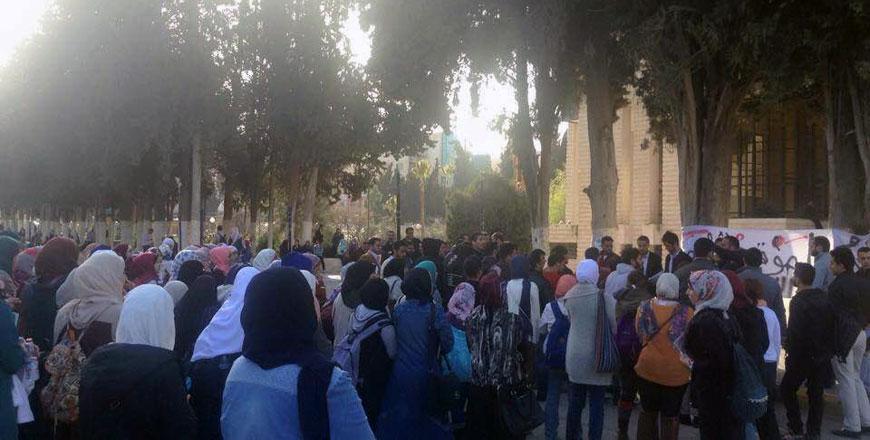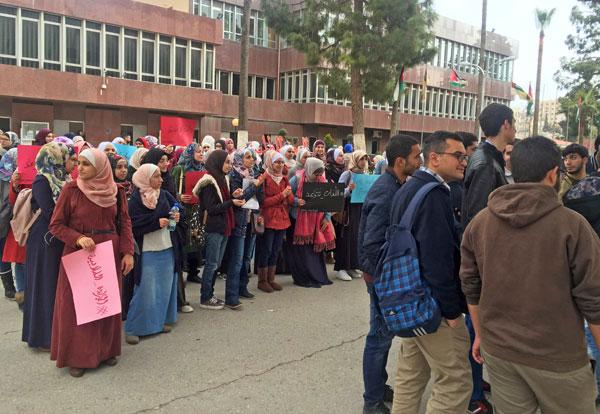You are here
UJ president plans to 'phase out' parallel programme as protest continues
By Suzanna Goussous - Mar 13,2016 - Last updated at Mar 13,2016

University of Jordan students protest recently to call for reversing a decision to raise tuition fees (Photo courtesy of Student Rally for the Cancellation of the Tuition Fee Hike)
AMMAN — A protest by University of Jordan (UJ) students over tuition fees entered its 15th day on Sunday, with the protesters still at odds with the UJ administration.
The students want UJ to reverse a decision to raise tuition fees for the parallel and post-graduate programmes, but the administration says the hikes affect a limited number of students, noting that the move was necessary to narrow the university's budget deficit.
In a statement issued by UJ on Sunday, the administration said the board of trustees and the protesters only met on March 7 aiming to reach an agreement regarding the issue.
The statement added that the protesters “did not find solutions to serve both parties”, despite the fact that representatives from the student body agreed initially to the conditions discussed by the board.
Students started protesting on February 28 demanding the reversal of the decision on tuition, taken in 2014, raising the fees for the parallel and post-graduate programmes by 100 to 180 per cent.
UJ President Ekhleif Tarawneh emphasised in a press conference late last week that the reversal of the decision is not the responsibility of the president, and that the board of trustees, which consists of 12 members, is the authority that can change or reverse the decision.
Following up on the protest, Tarawneh on Sunday wrote on his Facebook page that he will start working on phasing out the parallel programme, describing UJ as "the umbrella for many Jordanians and to others who saw it as a path to accomplish their dreams".
The parallel programme, which according to the UJ president was approved in the 1980s to cover the cost of the regular programme, is allocated for students whose General Secondary Education Certificate Examination scores do not qualify them to study specific subjects at public universities through the regular programme.
Tuition fees for this programme are higher than regular programmes.
Tarawneh said in his post that the group targeted through the parallel programme was the “more privileged” class, whose members can afford the more expensive credit hours, to cover the cost of the regular programme.
He did not give a specific timeline for the phasing out of the programme, but said that members of a committee from the trustee board will examine the possibility of treating excelling students as regular programme students in terms of tuition fees.
Commenting on Tarawneh's Facebook post, some students said scrapping the parallel programme is not the answer, while others said such a decision should not be posted on Facebook, and should be implemented on the ground through long-term plans.
Tarawneh was unavailable to comment on the matter later that day despite several attempts by The Jordan Times.
Related Articles
AMMAN — A protest by University of Jordan (UJ) students against a decision to raise tuition fees for the international, postgraduate and par
AMMAN — The University of Jordan (UJ) board of trustees on Monday decided to reduce the raise on the post-graduate programme's tuition by 50
AMMAN — As a protest by University of Jordan (UJ) students against tuition fee hikes entered its 12th day on Thursday, UJ President Ekhleif



















